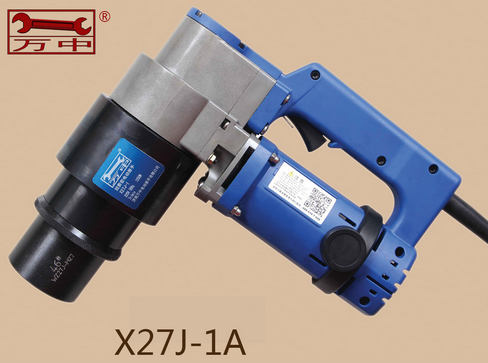扭力扳手有一根长的弹性杆,其一端装着手柄,另一端装有方头或六角头,在方头或六角头上套装一个可换的套筒,用钢珠卡住。在顶端上还装有一个长指针。刻度板固定在柄座上,每格刻度值为1N(或kg/m)。
The torque wrench has a long elastic rod, one end of which is equipped with a handle, and the other end is equipped with a square head or hexagonal head. A replaceable sleeve is set on the square head or hexagonal head, which is clamped with steel balls. There is also a long pointer on the top. The scale plate is fixed on the handle base, and the scale value of each grid is 1N (or kg/m).
使用前,先将安装在扳手上的指示器调整到所需的力矩,然后扳动扳手,当达到该预定力矩时,指示器上的指针就会向销轴一方转动,指针与销轴碰撞,通过音箱信号或传感信号告知操作者。
Before use, adjust the indicator installed on the wrench to the required torque, and then pull the wrench. When the predetermined torque is reached, the pointer on the indicator will turn towards the pin shaft, and finally the pointer collides with the pin shaft, and inform the operator through the speaker signal or sensor signal.
扭矩扳手(扭力扳手)发出卡塔声音的原理很简单,可以分为以下几个步骤去理解:
The principle of the torque wrench (torque wrench) to make the sound of the chatter is very simple, which can be understood in the following steps:

扭矩扳手在发出“卡塔”声后是提示已达到你要求的扭矩值了;
The torque wrench will prompt that the torque value you require has been reached after the sound of "jamming";
扭矩扳手所发出的“卡塔”是由本身内部的扭矩释放结构产生的,其结构分为压力弹簧扭矩释放关节扭矩顶杆三结构所组成
The "jam" sent by the torque wrench is generated by its internal torque release structure, which is composed of three structures: pressure spring torque release joint torque ejector rod
在扭矩扳手上设定所需扭矩值(由弹簧套在顶杆上向扭矩释放关节施压),锁定扭矩扳手,开始拧紧螺栓。当螺栓达到扭矩值(当使用扭力大于弹簧的压力)后,会产生瞬间脱节的效应。在产生脱节效应的瞬间发出关节敲击,扳手金属外壳所发出的“卡塔”声。由此来确认达到扭矩值的提醒作用(其实就象我们手臂关节成15度弯曲放在铁管里瞬间申直后会碰到钢管的原理一样)。
First, set the required torque value on the torque wrench (the spring is sleeved on the ejector pin to apply pressure to the torque release joint), lock the torque wrench and start tightening the bolts. When the bolt reaches the torque value (when the applied torque is greater than the pressure of the spring), it will produce the effect of instant disconnection. At the moment of producing the disjoint effect, the joint will knock, and the metal shell of the wrench will make a "jam" sound. This is to confirm the reminder effect of reaching the torque value (in fact, it is the same as the principle that our arm joint will touch the steel pipe after being bent at 15 degrees and placed in the iron pipe for an instant).
